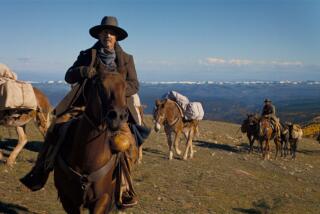JAZZ REVIEW : Watson Evokes Altered States at Elario’s
- Share via
LA JOLLA — Saxophonist Bobby Watson and Horizon put Elario’s to the test Wednesday night, and, after a four-hour torrent of music, the club and the high-rise hotel beneath still stood. Watson and his group aren’t really in the business of stress-testing structures, but their brand of jazz is some of the most potent stuff to hit the La Jolla club in months.
Watson, who cites a late 1970s stint in drummer Art Blakey’s Jazz Messengers as a turning point in his career, now leads a powerful, percussive band of his own.
Veteran drummer Victor Lewis’ dexterous, polyrhythmic playing drives the music relentlessly, and baby-faced band mates continually challenge their leader. Pianist Edward Simon is 21, and new trumpeter Terell Stafford, who cites Freddie Hubbard and Miles Davis as influences, is all of 24.
Along with raw musical ability, what makes this band so compelling is its spirit. Some groups wave their musical prowess in your face, taking a pedantic, professorial approach. But Watson, 37, and company create a jovial camaraderie that carries into the audience. They wink, nod, tease each other and break out in joyous laughter when a band member delivers yet another outrageous piece of playing.
Most of the material for two opening night sets came from Watson’s sizzling new album, “Post-Motown Bop.”
After a delayed flight from San Francisco, and without a sound check, the band nonetheless tore into its first set at a sprint, racing through “In Case You Missed It.”
Stafford and Watson blew incredibly long strings of notes that spiraled around each other and sailed into the stratosphere as Lewis quickly proved why he has been a favorite of Woody Shaw, Stan Getz, David Sanborn and others. Rolls swept over his drums like hail stones. Cymbals crashed as suddenly as lightning and his bass drum thundered.
Watson performed stormy feats of his own on alto and soprano saxes as the set continued through the Brazilian-flavored “Karita,” Lewis’ “Seventh Avenue,” Duke Ellington’s “In a Sentimental Mood” and Watson’s “Country Corn Flakes.”
Sometimes, Watson used a technique known as circular breathing to produce incredibly long strands of notes that carried you on a roller coaster of emotions at breakneck speeds. Other times, he dropped down several notches in pace and volume to whisper ballads.
The second set opened with the funky, tongue-in-cheek “Heckle and Jeckle,” with Horizon’s new bassist Essiet Okun Essiet popping things along. An extended “Falling in Love With Love” included a walking, talking bass solo by Essiet and mellow, sexy improvisations by Watson and Stafford, as Lewis eased the tune forward with brushes.
Lewis’ torchy “Big Girls” and “Love Remains” and Watson’s “The Punjab of Java Po” brought the evening to a close.
This is emotional music that evokes altered states in both musicians and listeners. When Watson’s solos reached particularly intense moments, as they often did, his eyes rolled back in his head so that only the whites were visible, as though he had entered musical samadhi, an Indian word referring to the ultimate communion with the divine.
“Post-Motown Bop” is Watson’s 12th album as a leader, and he has also recorded with Panama Francis, Louis Hayes, John Hicks, Sam Rivers and many other top players. Yet, despite his credentials and broad critical acclaim, by the end of the evening the audience had dwindled, consisting mostly of local musicians who watched in awe as they cheered Watson and his crew.
Take it from them. Watson is an original who deserves a broader hearing. He appears nightly through Sunday, with shows at 8:30 and 10:30.
More to Read
The biggest entertainment stories
Get our big stories about Hollywood, film, television, music, arts, culture and more right in your inbox as soon as they publish.
You may occasionally receive promotional content from the Los Angeles Times.









